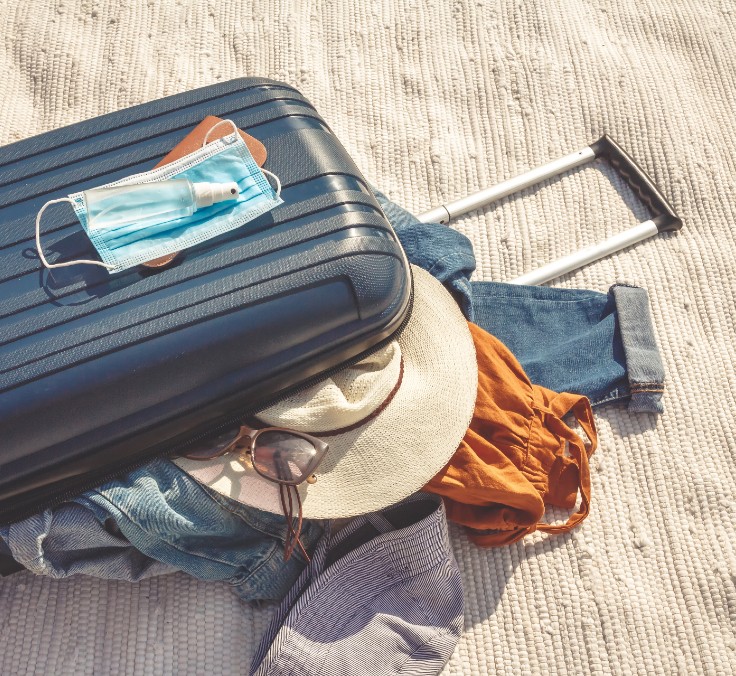SUSTAINABILITY| 04.08.2022
Six tips for a more sustainable vacation
Summer’s here, and millions of people around the world are thinking about getting away from the daily grind and going on vacation.
If your vacation is just around the corner or you’re enjoying it right now, don’t forget that making the most of the summer doesn’t mean you can ignore sustainability and responsibility. If you’re planning to travel, today we’ll give you 6 tips to have a sustainable vacation without missing out on the fun and having a chance to disconnect. At MAPFRE, we urge people to not let their guard down during this period of the year and lose their good habits.
What is sustainable tourism?
The first step to practicing sustainable tourism is stopping to think about whether what we do as tourists respects our natural, social, and cultural surroundings. But what does this type of tourism involve?
Sustainable and responsible tourism means traveling in a way that leaves the smallest footprint possible in order to minimize any negative consequences. It stands as an alternative to the massive and unsustainable tourism that many destinations experience.
Although sustainable vacations are possible anywhere in the world, there are some things that can make a trip more or less sustainable, such as how we travel or what we consume. Another detail that can make a huge difference is where we stay: a study conducted by Airbnb in 2016 found that staying in apartments, or what is known as homesharing, is more sustainable than staying in a hotel. They reached this conclusion because they observed that people used 48% less water and 78% less energy in apartments compared to hotels. In addition, owners can guide their guests to use good practices in the home, such as encouraging recycling by setting out specific bins.
Our tips for a more sustainable vacation
If you want to take responsibility for the footprint you leave on the places you visit this summer, here are a few tips to help you have a sustainable vacation:
- Choose the most sustainable transportation available
Whenever possible, it’s important to use sustainable means of transportation to travel to and from your destination. For instance, a good choice for avoiding the hassle of using a GPS or a map is taking public transportation when you arrive at your destination. If the local area is fit for it, getting around either on foot or by bicycle is also a good option. That way you can enjoy the views, while also doing something healthy. There’s no better way to enjoy your destination than not having to think about where to park. You can just roam the streets, sightsee, and above all, not pollute.
If you have no choice but to fly and you want to offset your environmental footprint, more and more airlines are offering carbon credits to mitigate the emissions you generate and make your trip a sustainable one.
- Go local
Another way to do sustainable tourism is to prioritize proximity. How can you do that? Very simple. Patronizing restaurants that serve local cuisine is a great way to help the regional economy. Plus, these establishments also tend to use local ingredients, so you’ll be supporting the production of zero KM food while also learning about the destination’s culinary culture.
You’ll probably find large chain stores to do your shopping at. But since you’re visiting a place that’s new, don’t settle for places you can find anywhere: take the opportunity to visit local stores. This way, apart from supporting the local economy, you’ll come across special items that will always remind you of your trip.
- Promote philanthropy tourism
This concept comes from the word “philanthropy“, which comes from the Greek word “phylo”, love, and “anthropos”, human, that is to say, “love for the human being” or “love for humanity.”
The pandemic has brought about a change in the way people travel, and proof of this is philanthropy tourism, which involves choosing a destination in need of travelers. Travelers looking for personalized experiences and privacy, as well as using travel to help out, have popularized this concept. It was born from the need to make responsible activities part of local environments and to make destinations the focal point of a vacation. By practicing this type of tourism, you’ll discover incredible places that are far from the hustle and bustle, and you can make a positive impact on the communities and their local economy by doing your part.
- Use eco-friendly sunscreens
People worry too much about whether or not a cosmetic product will benefit them, and not enough about how it will impact the rest of the planet. Unfortunately, one product that impacts the planet and that we use huge amounts of in the summer is sunscreen. Many of them include compounds that are harmful to the seabed, such as titanium dioxide. We should take this fact into account and seek out alternatives that are as eco-friendly as possible and that impact the environment the least. Nowadays many sunscreens already indicate this on their packaging, so it’s easy to find eco-friendly alternatives. Even so, watch out for certain preservatives and additives that are also harmful and appear under these names: parabens, pthalates, triclosan, or microbeads (which are plastic).
- Reduce your footprint
Even if you’re on vacation, take responsibility for the waste you generate. Avoid using plastics and dispose of them properly. This should go without saying, but it never hurts to have a little reminder. It’s as simple as collecting everything you’ve brought with you, whether you’re at the beach, in the mountains, or anywhere else. If it wasn’t there when you arrived, don’t leave it there.
When traveling and spending long periods away from home, plan to buy only what you really need and don’t let yourself get carried away by excessive consumption and waste. Also, don’t forget that water and electricity should be used responsibly even in the summer.
- Keep on recycling wherever you go
This point should also go without saying. On vacation, be careful to not leave any litter in the local area and continue to recycle wherever you go. In any city, even in the smallest ones, you can find specific containers for recycling. If you’re enjoying your vacation with your children, this is a great opportunity to teach them how to respect and care for the environment. It’s crucial to take responsibility for what you consume and to continue to place each type of waste in its corresponding recycling bin.
Although we’re still far from being able to stop the climate emergency, we see society becoming more and more committed to the environment. According to the sociological report prepared by Catchment for Ecoembes, 38.9 million Spaniards claim to be recyclers in their daily lives, a habit they put into practice to help take care of the environment. That’s why it’s essential to not lose these good habits when we’re on vacation.
Lastly, when planning for sustainable travel, find out if your destination is a place where you’ll be able to keep up your sustainable habits. There are many ways we can contribute to minimizing the environmental impact during a sustainable vacation.
At MAPFRE, we also insist that a sustainable vacation is possible as long as we pay a little more attention to the way we do things and are aware that what we do will have a substantial impact on the destination in economic, social, and environmental terms. Promoting sustainable tourism helps to promote the conservation of the places we visit, which is essential to making sure future generations can enjoy them for a long time to come. And remember: look after your destination just the way you would like your own area to be looked after.
RELATED ARTICLES:






